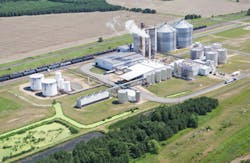Refineries that produce ethanol fuel may be releasing much larger amounts of some pollutants than previously thought, according to a study in the Journal of Geophysical Research: Atmospheres, a publication of the American Geophysical Union.
Researchers found that emissions of certain ozone-forming compounds from an ethanol refinery in Illinois were many times higher than government estimates.
Airborne measurements downwind from the Archer Daniels Midland refinery in Decatur showed that ethanol emissions were 30 times higher than government estimates. Emissions of all volatile organic compounds (VOCs), which include ethanol, were five times higher.
VOCs and nitrogen oxides react with sunlight to form ground-level ozone, the main component of smog.
Under federal renewable fuel standards, ethanol made from corn constitutes approximately 10 percent of the fuel used in gasoline vehicles in the United States. According to the U.S. Environmental Protection Agency, this rule is intended to reduce greenhouse gas emissions and petroleum imports, while boosting the U.S. renewable fuels sector.
However, if emissions at the more than 200 refineries across the country are similar to those at the Decatur plant, ethanol fuel production is a larger source of ethanol and VOCs than burning the ethanol fuel in a car. The new measurements showed that ethanol emissions from production of one kilogram of ethanol at the refinery were 170 times higher than what comes out of a vehicle burning the same amount of ethanol.
The findings suggest that more measurements need to be taken of the emissions coming from ethanol fuel refineries.
"Obviously, this was just one refinery that we looked at, so we'd like to do more and see if these findings are more universal or if this plant was just exceptional," said lead author Joost de Gouw, a scientist at the Cooperative Institute for Research in Environmental Sciences at the University of Colorado Boulder and NOAA's Earth System Research Laboratory in Boulder, Colorado.


